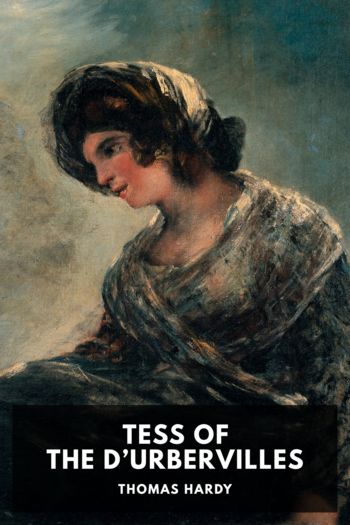Tess of the d’Urbervilles - Thomas Hardy (best color ereader .txt) 📗

- Author: Thomas Hardy
Book online «Tess of the d’Urbervilles - Thomas Hardy (best color ereader .txt) 📗». Author Thomas Hardy
They walked later on Sundays, when it was quite dark. Some of the dairy-people, who were also out of doors on the first Sunday evening after their engagement, heard her impulsive speeches, ecstasized to fragments, though they were too far off to hear the words discoursed; noted the spasmodic catch in her remarks, broken into syllables by the leapings of her heart, as she walked leaning on his arm; her contented pauses, the occasional little laugh upon which her soul seemed to ride—the laugh of a woman in company with the man she loves and has won from all other women—unlike anything else in nature. They marked the buoyancy of her tread, like the skim of a bird which has not quite alighted.
Her affection for him was now the breath and life of Tess’s being; it enveloped her as a photosphere, irradiated her into forgetfulness of her past sorrows, keeping back the gloomy spectres that would persist in their attempts to touch her—doubt, fear, moodiness, care, shame. She knew that they were waiting like wolves just outside the circumscribing light, but she had long spells of power to keep them in hungry subjection there.
A spiritual forgetfulness coexisted with an intellectual remembrance. She walked in brightness, but she knew that in the background those shapes of darkness were always spread. They might be receding, or they might be approaching, one or the other, a little every day.
One evening Tess and Clare were obliged to sit indoors keeping house, all the other occupants of the domicile being away. As they talked she looked thoughtfully up at him, and met his two appreciative eyes.
“I am not worthy of you—no, I am not!” she burst out, jumping up from her low stool as though appalled at his homage, and the fullness of her own joy thereat.
Clare, deeming the whole basis of her excitement to be that which was only the smaller part of it, said—
“I won’t have you speak like it, dear Tess! Distinction does not consist in the facile use of a contemptible set of conventions, but in being numbered among those who are true, and honest, and just, and pure, and lovely, and of good report—as you are, my Tess.”
She struggled with the sob in her throat. How often had that string of excellences made her young heart ache in church of late years, and how strange that he should have cited them now.
“Why didn’t you stay and love me when I—was sixteen; living with my little sisters and brothers, and you danced on the green? O, why didn’t you, why didn’t you!” she said, impetuously clasping her hands.
Angel began to comfort and reassure her, thinking to himself, truly enough, what a creature of moods she was, and how careful he would have to be of her when she depended for her happiness entirely on him.
“Ah—why didn’t I stay!” he said. “That is just what I feel. If I had only known! But you must not be so bitter in your regret—why should you be?”
With the woman’s instinct to hide she diverged hastily—
“I should have had four years more of your heart than I can ever have now. Then I should not have wasted my time as I have done—I should have had so much longer happiness!”
It was no mature woman with a long dark vista of intrigue behind her who was tormented thus, but a girl of simple life, not yet one-and-twenty, who had been caught during her days of immaturity like a bird in a springe. To calm herself the more completely, she rose from her little stool and left the room, overturning the stool with her skirts as she went.
He sat on by the cheerful firelight thrown from a bundle of green ash-sticks laid across the dogs; the sticks snapped pleasantly, and hissed out bubbles of sap from their ends. When she came back she was herself again.
“Do you not think you are just a wee bit capricious, fitful, Tess?” he said, good-humouredly, as he spread a cushion for her on the stool, and seated himself in the settle beside her. “I wanted to ask you something, and just then you ran away.”
“Yes, perhaps I am capricious,” she murmured. She suddenly approached him, and put a hand upon each of his arms. “No, Angel, I am not really so—by nature, I mean!” The more particularly to assure him that she was not, she placed herself close to him in the settle, and allowed her head to find a resting-place against Clare’s shoulder. “What did you want to ask me—I am sure I will answer it,” she continued humbly.
“Well, you love me, and have agreed to marry me, and hence there follows a thirdly, ‘When shall the day be?’ ”
“I like living like this.”
“But I must think of starting in business on my own hook with the new year, or a little later. And before I get involved in the multifarious details of my new position, I should like to have secured my partner.”
“But,” she timidly answered, “to talk quite practically, wouldn’t it be best not to marry till after all that?—Though I can’t bear the thought o’ your going away and leaving me here!”
“Of course you cannot—and it is not





Comments (0)